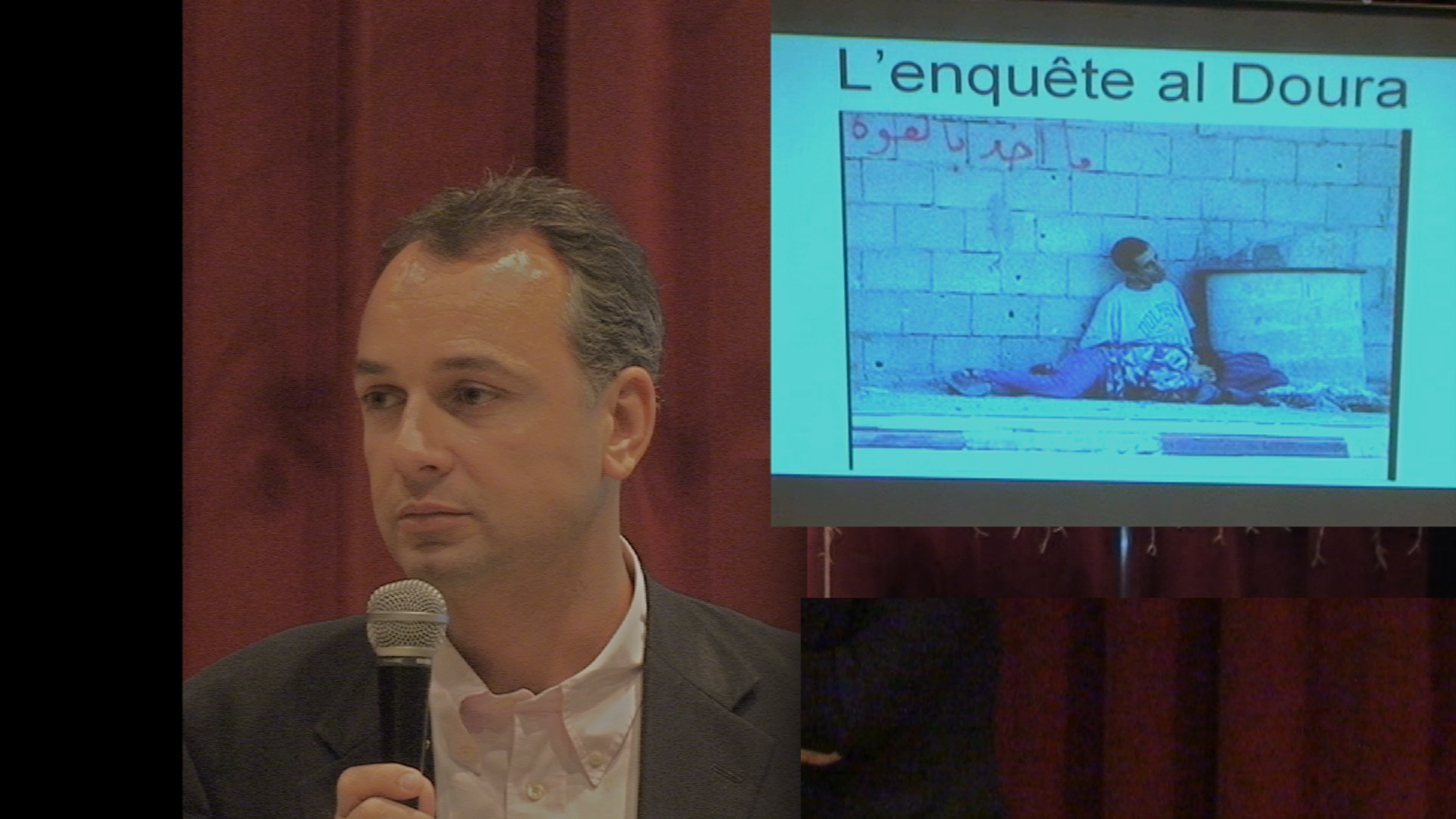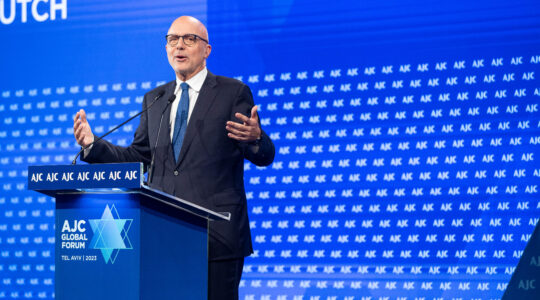PARIS (JTA) — To his allies, he’s a bulldog. Enemies call him a conspiracist and a genocide denier.
Both sides, however, agree on one thing: One could find a more pleasant adversary than French-Jewish politician and activist Philippe Karsenty.
It’s an impression easily reached in even a short conversation with Karsenty, the 46-year-old known in France for his 12-year battle to prove that a Palestinian boy, Mohammed al-Dura, was not shot and killed by Israeli soldiers as appears to be the case in a now-famous video first broadcast by a French television station.
Despite years of legal wrangling, public recriminations and high-profile setbacks, Karsenty remains unrepentant. He is utterly convinced of his rightness and won’t stop until everybody else knows it, too.
Karsenty entered public life after he claimed that the footage of al-Dura crouching with his father behind a barricade as bullets whiz overheard, broadcast by the France 2 television station in 2000, is in fact a hoax. The unsettling image of al-Dura’s death emerged as an iconic and recurrent motif of the second intifada, helping to galvanize public opinion against the Jewish state in the early days of the uprising and, many claim, spawning terrorist attacks against Israeli civilians and Jews elsewhere.
Karsenty claims the angle of the bullets hitting the wall behind the boy proves they could not have come from the Israeli side.
More than a decade into the fight, Karsenty, a stock broker and former businessman, acknowledges that the years of legal battle have taken their toll and exacted so high a financial cost that he refuses to fully reveal it.
Since Karsenty became involved with l’affaire al-Dura, his life has been transformed. He has launched a moderately successful political career, winning election as the deputy mayor of his prosperous Paris suburb but failing in his bid for a seat in the French parliament. He split from his party, Nicolas Sarkozy’s Union for a Popular Movement, accusing the former French president of being soft on jihadism. He has run afoul of officials of the very country he has sought to exonerate and been vilified in the French media. And he has waged a protracted legal fight, filled with suits and countersuits, to pressure France 2 to release extended footage that Karsenty says will prove the common assumptions about al-Dura’s death are lies.
But through it all, Karsenty has remained undaunted, telling JTA that he has recently decided to double down and devote even more time and attention to “fighting the hoax.”
“When I first saw the al-Dura footage I thought, like everyone, that Israeli troops killed the boy, probably by accident,” Karsenty recalls.
Initially, Israel seemed to agree. But an Israeli investigation later found that the bullets likely came from Palestinian gunmen who exchanged fire with Israel Defense Forces soldiers on the day al-Dura was shot. That probe, along with the work of independent investigators, gradually convinced Karsenty that France 2’s footage was fake and he began saying as much to French journalists.
In 2004, the France 2 reporter who first broadcast the footage, Charles Enderlin, sued Karsenty for defamation and the two have been duking it out in court ever since. Their next court appearance is scheduled for January.
Meanwhile, rhetoric was overheating. Larry Derfner, wriitng in The Jerusalem Post this year, called Karsenty and Richard Landes “conspiracy freaks” acting out of “pure paranoia.” Landes is a Boston University historian who has researched the al-Dura case with Karsenty and also believes the video is fake.
The Wall Street Journal reported that Enderlin’s lawyer called Karsenty “a cross between Thierry Meyssan and Robert Faurisson,” a Sept. 11 cospiracist and a Holocaust denier, respectively. Hundreds of French journalists signed a 2008 petition calling Karsenty’s actions “hateful,” and others have labeled him a conspiracist.
“The fact they call me, a French Jew, a genocide denier demonstrates the intensity of hatred that al-Dura provokes in the other side,” Karsenty said.
For his part, Karsenty was hardly keeping quiet. He sued two other French media outlets for defamation, one of which led to a ruling in his favor in 2010. Another ruling found the broadcaster Canal+ to have committed libel against Karsenty, albeit unintentionally.
His legal battle with Enderlin centers on the full 27-minute video that a France 2 cameraman, Talal abu Rahma, shot in Gaza and which the network has refused to release. In 2008, Karsenty convinced a French court of appeals to view the full footage, after which the judges cleared Karsenty of defamation charges. Al-Dura skeptics hailed the ruling as a major breakthrough, but the French Supreme Court overturned that ruling this year on a technicality. Karsenty has appealed and will meet Enderlin in court again in January.
Karsenty also has attacked the country whose interests he was seemingly trying to serve. He has lambasted Israel publicly for its failure to press the al-Dura matter and accused some officials of trying to sabotage his efforts. Though Israeli officials largely agree with Karsenty’s view on al-Dura, the government has distanced itself from him.
“Philippe is like a bulldog,” Landes said. “He gets his teeth into something and he does not let go.”
Questions began arising about the al-Dura video in the early 2000s, but it was Karsenty who “had the stamina to fight in court in France and in the French media,” Landes said. Landes acknowledges Karsenty’s occasionally “abrasive personality” has led to conflicts with potential allies.
In 2006, Karsenty claims that Daniel Shek, Israel’s former ambassador in Paris, refused to shake his hand at a cocktail reception and publicly called him a “conspiracist.” Shek denies the claim and accuses Karsenty of making “multitudes of mind-boggling and vile allegations and accusations” against him. Shek did not offer examples.
Yigal Palmor, a senior spokesman for the Israeli Ministry of Foreign Affairs, declined to comment directly on the incident.
“Maybe, just maybe, badmouthing people in public is not the best way to befriend them,” Palmor said.
Karsenty, speaking of the dispute with Shek, said “I’m sure I haven’t handled things perfectly. I’m not the perfect person; nobody is. I’ve made mistakes, but none to explain why Shek would make such a public act. It shocked me.”
Karsenty is not without allies, however. He has received support in the United States from the Zionist Organization of America, and Roger Cukierman, former president of the umbrella group of French Jewish communities, CRIF, said he holds Karsenty in high regard.
“I admire Philippe’s devotion and perseverance,” Cukierman said. “He has conviction that he’s in the right. People like that, who are used to standing alone for what they believe in, often have very strong personalities that sometimes lead to clashes.”
This year, Israelis again deeply disappointed Karsenty when he lost his bid to enter the French National Assembly as the representative of French expatriates residing in Israel and several nearby countries.
In his political career, Karsenty has demonstrated the same firebrand activism that appears to have alienated the Israelis. After leaving the UMP party last year, he accused Sarkozy of “inaction and passivity” on jihadism. Karsenty then ran for the French parliament as an independent and lost, deprived of the support and resources of his former party.
With the election behind him, Karsenty intends to intensify efforts to refute the al-Dura case.
“I have more time to devote to preparing for court,” said Karsenty, who also lectures abroad on the topic.
Karsenty speaks of the al-Dura affair as a quest for justice and truth, but the businessman in him knows it has not been cost effective. Karsenty says he has spent an “obscene” amount of money — so much he will not quantify it. Though he earns some money from lectures he has delivered in Europe, the United States, China, India and Australia, he says he has still registered a huge loss.
He says he would let the matter drop were it not for the fact that so many, especially Israel’s enemies, still believe al-Dura died at the hands of Jewish soldiers.
“The al-Dura myth lives on in the Arab and Muslim world,” he said. Postage stamps memorializing al-Dura have appeared in Tunisia, Egypt, Iran and Jordan.
Despite the price it has paid, both in lives lost and public image, Israel refuses to endorse Karsenty’s efforts.
“He has presented his work to a number of Israeli officials, including myself, but he has carried out his work by himself and has not garnered any official support,” Palmor told JTA. “His work is his own.”
JTA has documented Jewish history in real-time for over a century. Keep our journalism strong by joining us in supporting independent, award-winning reporting.






